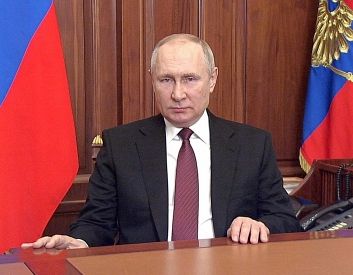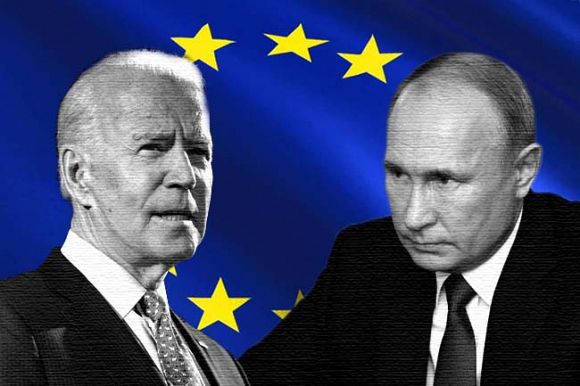Bryce Wilson was the first Australian journalist to embed with the Ukrainian army and Ukrainian special forces during combat deployments. This personal account shares friends and colleagues' experiences of war in Ukraine as it unfolds.
Dima fleeing the war
I met Dima in 2016. He messaged me on Reddit, proudly telling me he was from Kramatorsk and wanted to meet me. He’s a soft-spoken guy — self-employed, making money through online platforms and selling teaching materials.
Dima lived in Kramatorsk when it was captured by Russian-local forces in 2014 and when it was liberated by the Armed Forces of Ukraine. Could recall when a Russian rocket attack landed in the streets of the city, outside his apartment. He wanted to leave Kramatorsk in the days before the invasion. He had been struggling with anxiety while the invasion loomed over Ukraine and the Donbas.
Dima is cut off from his work due to American sanctions, which target the entirety of the occupied territories of Donetsk and Luhansk Oblast, despite living in Ukrainian Government-controlled areas.
Kostya preparing to return to war
Kostya has been my babysitter since 2015.
The first time we met on the front lines, he told me — in very broken English:
"I’m not a translator, I’m just your babysitter… fuck."
Since our time together, we became close and have maintained a longstanding friendship. Recently, Kostya got married to Ksu. I think she really helped him recover from some of his experiences during and following the war.
It’s surreal to be in Kyiv with him while we listen to war — because only two weeks ago we were watching videos from 2015 and talking about how part of our life and experiences together were compartmentalised to that one region. Now, military fortifications, war sounds and armoured vehicles are at our doorstep again.
Kostya has an Avtomat Kalashnikov (AK) rifle, body armour and ammo. He was present during battles in his area of Kyiv at the beginning of the invasion. He now worries about his wife’s safety if he goes to war.
Dakota's (foreign volunteer) experience of combat
Dakota messaged me through Instagram. He was sharp and to the point. He wanted to enlist as a foreigner — he accepted that he might die, but was confident he had the skills to succeed.
A U.S. Marine infantryman, he’d previously been deployed to Afghanistan. I got him in touch with a civil volunteer in Lviv that I thought might be able to help.
Dakota crossed the Polish border and enlisted in Ukraine. Then he went dark for a few days. I received a message from him. He had spent time at the base near Poland, which would later be blown up by Russian missiles on 13 March.
He’d already been deployed quickly after arrival — had been in battle for four days. He described the shelling as "unreal", unlike anything he had ever experienced during any combat. But the rest was easy, he said.
Wrote Dakota:
‘They had no will to fight and we held them for days.'
Dakota reported 30 Russian soldiers killed by his unit, with no casualties taken themselves. He said his rifle was a piece of shit that did the job, but he wanted to upgrade it soon.
Stefan and Emil on the front line
I met Stefan and Emil through Twitter. We met up for the first time in Kramatorsk.
We clicked very quickly — covered a story in Stanytsia Luhanska and broke news about the attack on the kindergarten there. We began working together on different journalism projects while I filmed a documentary.
Stefan and Emil went back to the front line. They were both shot by a suspected Russian saboteur.
Stefan and Emil are incredibly talented and gifted at what they do and have made a lasting impression on me, both professionally and personally. I would call them true friends, the type of people I would want to be in touch with for years to come.
They did a lot of great work during their time here. Together, we investigated bomb shelter preparedness, the readiness of a hospital, conducted field interviews and research about infrastructure damage, etcetera. All our own Russian language content.
The day after the invasion, Stefan and Emil went back to the front line. They were both shot by a suspected Russian saboteur. Both survived with multiple gunshot wounds to the upper and lower body.
Emil told me he is not doing this work again. Stefan is planning to return to Ukraine as soon as he can.
Bryce Wilson is a photographer, filmmaker and freelance photojournalist from Melbourne, Australia. He has been focused on the war and humanitarian crisis in Ukraine’s east since 2015 and was the first Australian journalist to embed with the Ukrainian army and Ukrainian special forces during combat deployments. You can follow Bryce on Twitter @brycewilsonAU.
Related Articles
- Understanding the war in Ukraine
- Alexander Dugin: A Russian fascist who helped to convince Putin to invade
- We must remember women during the war in Ukraine
- Like Vietnam, Ukraine dragged into bloody conflict
- Ukraine: Three decades after the Cold War, back to open conflict
 This work is licensed under a Creative Commons Attribution-NonCommercial-NoDerivs 3.0 Australia License
This work is licensed under a Creative Commons Attribution-NonCommercial-NoDerivs 3.0 Australia License
Support independent journalism Subscribe to IA.












